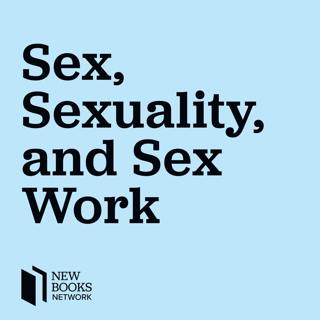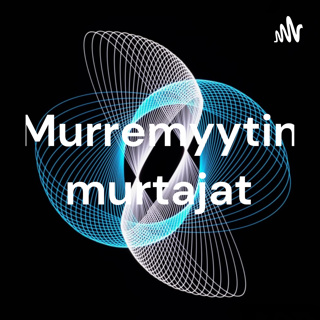
Sexual Imperialism and English Language Teaching
In this episode of the Language on the Move Podcast, Dr Hanna Torsh speaks with Dr Vaughan Rapatahana about sexual predation in the English language teaching industry. The conversation addresses his new book Sexual Predation and TEFL: The teaching of English as a Foreign Language Enables Sexual Predation (Brill, 2024), which explores how teaching English overseas intersects with and enables widespread sexual exploitation. Trigger warning: this show discusses sexual exploitation and related content that listeners may find distressing. For additional resources, show notes, and transcripts, go here. Learn more about your ad choices. Visit megaphone.fm/adchoices
2 Syys 31min

Marla Segol, "Kabbalah and Sex Magic: A Mythical-Ritual Genealogy" (Pennsylvania State UP, 2022)
In Kabbalah and Sex Magic: A Mythical-Ritual Genealogy (Penn State University Press, 2021) a provocative book, Marla Segol explores the development of the kabbalistic cosmology underlying Western sex magic. Drawing extensively on Jewish myth and ritual, Segol tells the powerful story of the relationship between the divine and the human body in late antique Jewish esotericism, in medieval kabbalah, and in New Age ritual practice. Kabbalah and Sex Magic traces the evolution of a Hebrew microcosm that models the powerful interaction of human and divine bodies at the heart of both kabbalah and some forms of Western sex magic. Focusing on Jewish esoteric and medical sources from the fifth to the twelfth century from Byzantium, Persia, Iberia, and southern France, Segol argues that in its fully developed medieval form, kabbalah operated by ritualizing a mythos of divine creation by means of sexual reproduction. She situates in cultural and historical context the emergence of Jewish cosmological models for conceptualizing both human and divine bodies and the interactions between them, arguing that all these sources position the body and its senses as the locus of culture and the means of reproducing it. Segol explores the rituals acting on these models, attending especially to their inherent erotic power, and ties these to contemporary Western sex magic, showing that such rituals have a continuing life. Asking questions about its cosmology, myths, and rituals, Segol poses even larger questions about the history of kabbalah, the changing conceptions of the human relation to the divine, and even the nature of religious innovation itself. This groundbreaking book will appeal to students and scholars of Jewish studies, religion, sexuality, and magic. Jana Byars is the Academic Director of Netherlands: International Perspectives on Sexuality and Gender. Learn more about your ad choices. Visit megaphone.fm/adchoices
17 Elo 56min

Marla Segol, "Kabbalah and Sex Magic: A Mythical-Ritual Genealogy" (Pennsylvania State UP, 2022)
In Kabbalah and Sex Magic: A Mythical-Ritual Genealogy (Penn State University Press, 2021) a provocative book, Marla Segol explores the development of the kabbalistic cosmology underlying Western sex magic. Drawing extensively on Jewish myth and ritual, Segol tells the powerful story of the relationship between the divine and the human body in late antique Jewish esotericism, in medieval kabbalah, and in New Age ritual practice. Kabbalah and Sex Magic traces the evolution of a Hebrew microcosm that models the powerful interaction of human and divine bodies at the heart of both kabbalah and some forms of Western sex magic. Focusing on Jewish esoteric and medical sources from the fifth to the twelfth century from Byzantium, Persia, Iberia, and southern France, Segol argues that in its fully developed medieval form, kabbalah operated by ritualizing a mythos of divine creation by means of sexual reproduction. She situates in cultural and historical context the emergence of Jewish cosmological models for conceptualizing both human and divine bodies and the interactions between them, arguing that all these sources position the body and its senses as the locus of culture and the means of reproducing it. Segol explores the rituals acting on these models, attending especially to their inherent erotic power, and ties these to contemporary Western sex magic, showing that such rituals have a continuing life. Asking questions about its cosmology, myths, and rituals, Segol poses even larger questions about the history of kabbalah, the changing conceptions of the human relation to the divine, and even the nature of religious innovation itself. This groundbreaking book will appeal to students and scholars of Jewish studies, religion, sexuality, and magic. Jana Byars is the Academic Director of Netherlands: International Perspectives on Sexuality and Gender. Learn more about your ad choices. Visit megaphone.fm/adchoices
17 Elo 56min

Ayo Wahlberg, "Good Quality: The Routinization of Sperm Banking in China" (U California Press, 2018)
From its crude and uneasy beginnings thirty years ago, Chinese sperm banking has become a routine part of China’s pervasive and restrictive reproductive complex. Today, there are sperm banks in each of China’s twenty-two provinces, the biggest of which screen some three thousand to four thousand potential donors each year. Given the estimated one to two million azoospermic men--those who are unable to produce their own sperm--the demand remains insatiable. China’s twenty-two sperm banks cannot keep up, spurring sperm bank directors to publicly lament chronic shortages and even warn of a national ‘sperm crisis’ (jingzi weiji). Ayo Wahlberg book Good Quality: The Routinization of Sperm Banking in China (U California Press, 2018) explores the issues behind the crisis, including declining sperm quality in the country due to environmental pollution, as well as a chronic national shortage of donors. In doing so, Wahlberg outlines the specific style of Chinese sperm banking that has emerged, shaped by the particular cultural, juridical, economic and social configurations that make up China’s restrictive reproductive complex. Good Quality shows how this high-throughput style shapes the ways in which men experience donation and how sperm is made available to couples who can afford it. Victoria Oana Lupascu is a PhD candidate in dual-title doctoral program in Comparative Literature and Asian Studies at the Pennsylvania State University. Her areas of interest include 20th and 21st Chinese literature and visual art, medical humanities and Global South studies. Learn more about your ad choices. Visit megaphone.fm/adchoices
8 Elo 1h 12min

Chris Washington, "Nonbinary Jane Austen" (U Minnesota Press, 2025)
In Nonbinary Jane Austen, Chris Washington theorizes how Jane Austen envisions a nonbinary future that traverses the two-sex model of gender that we can supposedly see solidifying in the eighteenth century. Arguing that her writing works to abolish gender exclusivity altogether, Washington shows how she establishes a politics that ushers in a future built on plurality and possibility. Chris Washington is associate professor of English at Francis Marion University in South Carolina, USA. Washington is the editor of a recent Norton Critical Edition of Mary Shelley’s The Last Man and is the author of Nonbinary Jane Austen, Romantic Revelations: Visions of Post-Apocalyptic Hope and Life in the Anthropocene (University of Toronto Press, 2019), and essays on the literature of the Romantic period and on contemporary theory and philosophy. Tristan Burke researches and teaches eighteenth and nineteenth-century literature and continental philosophy. He is the author of Byronism, Napoleonism, and Nineteenth-Century Realism: Heroes of Their Own Lives? (Routledge, 2022) Learn more about your ad choices. Visit megaphone.fm/adchoices
2 Elo 1h 9min

Hannah Charnock, "Teenage intimacies: Young Women, Sex and Social Life in England, 1950-80" (Manchester UP, 2025)
Teenage Intimacies offers a new account of the ‘sexual revolution’ in mid-twentieth century England. Rather than focusing on ‘Swinging London’, the book reveals the transformations in social life that took place in school playgrounds, local cinemas, and suburban bedrooms. Based on over 300 personal testimonies, Teenage Intimacies traces the everyday experiences of teenage girls, illuminating how romance, sex and intimacy shaped their young lives. The book shows how sex became embedded in ideas about ‘growing up’ and explores how heterosexuality influenced young women’s social lives and vice versa. It offers new explanations of why sexual mores shifted in this period, revealing the pivotal role that young women played in changing sexual values, cultures and practices in the 1950s, 1960s and 1970s. Learn more about your ad choices. Visit megaphone.fm/adchoices
2 Elo 41min

Marion Bower, "The Life and Work of Joan Riviere: Freud, Klein and Female Sexuality" (Routledge, 2018)
Joan Riviere (1883-1962) is best known for her role in promoting the ideas of others. She came to prominence in the world of psychoanalysis as Freud’s favorite translator and Melanie Klein’s earliest and most loyal supporter. In her new book The Life and Work of Joan Riviere: Freud, Klein and Female Sexuality (Routledge, 2018), Marion Bower puts Joan Riviere herself, the woman and the psychoanalyst, in the spotlight. She shows how Riviere made use of the latest psychoanalytic ideas in a highly creative and original way, expressing herself with clarity and emotional depth in seminal works about the inner life of female sexuality and treatment impasses. She was able to draw from a lifetime of challenging and fruitful experiences. After a childhood rife with emotional neglect, she stepped into the rich ferment of the dying Victorian era and came in touch with major progressive forces of the time like the suffragettes and the Society for Psychical Research. As a dressmaker’s apprentice, she was among the first wave of women entering the work force. When the shifting soil of her childhood proved unstable, she entered analysis with Ernest Jones and, after becoming an analyst, with Freud himself. This personal connection proved fortuitous to the newly formed British Psychoanalytic Society, as it provided a solid anchor against the dividing drift between Anna Freud and Melanie Klein. Bower paints an intimate portrait of a woman with a stern and sometimes vitriolic public persona and a shy and fragile personality that was saved by her involvement in psychoanalysis. In her best moments she was able to bridge that gap in her psychoanalytic writing, revealing herself through her theoretical musings. Marion Bower has trained as a teacher, social worker and psychoanalytic psychotherapist. She has worked for many years in the child mental health services, including the Tavistock Clinic, and has edited and co-edited four books on various applications of psychoanalysis. She is currently co-editing a book on sexual exploitation. Sebastian Thrul is a psychiatrist and psychoanalyst in training in Germany and Switzerland. He can be reached at sebastian.thrul@gmx.de. Learn more about your ad choices. Visit megaphone.fm/adchoices
27 Heinä 58min


















